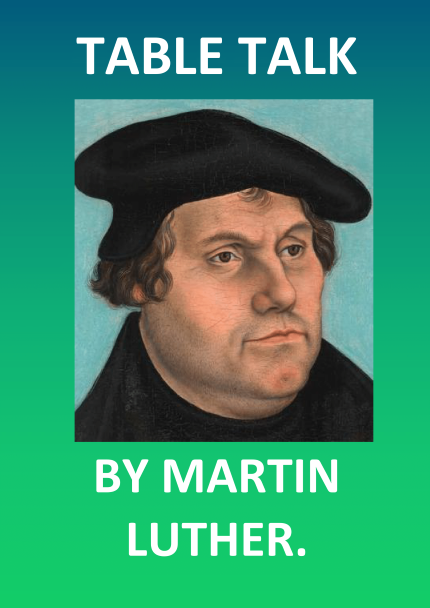Table Talk is a collection of informal conversations and reflections from Martin Luther, recorded by his students and followers between 1531 and 1544. These discussions took place at Luther’s home in Wittenberg, where he freely shared his thoughts on theology, scripture, the Reformation, and everyday life.

Table Talk.
By Dr. Martin Luther.
TRANSLATED BY
WILLIAM HAZLITT, Esq
Martin Luther’s Table Talk captures his candid conversations on faith, scripture, and life, offering deep insights into the mind of the great Reformer.
Martin Luther’s “Table Talk”: Insights from Conversations at the Dining Table
The reader can get an insights of Martin Luther through his work “Table Talk,” a compilation of discussions held during family meals. This unique collection offers a glimpse into Luther’s thoughts on theology, life, and the Reformation.
Informal Dialogues:
“Table Talk” captures Luther’s informal conversations with friends and family around the dining table. These discussions, often unscripted, provide a more personal and candid perspective on his views.
Theological Reflections:
Within these dialogues, Luther delves into a range of theological topics, sharing his perspectives on faith, grace, and the Christian life. The informal setting allows for a deeper understanding of his convictions and beliefs.
Daily Life and Anecdotes:
In addition to theological discussions, “Table Talk” includes anecdotes and reflections on daily life. Luther’s wit and wisdom shine through as he addresses a variety of subjects, offering valuable insights into the man behind the Reformation.
Explore Martin Luther’s “Table Talk,” family conversations, Reformation insights, theological discussions, and Luther’s daily reflections.
Lutherhaus:
Table Talk is a collection of Martin Luther’s sayings around the dinner table at Lutherhaus, Luther’s home, but also at other times and locations, such as walks in the garden or notes taken while on journeys.
It was compiled by Johannus Mathesius, J. Aurifaber, V. Dietrich, Ernst Kroker, and several others, and published at Eisleben in 1566.
Mathesius spoke enthusiastically of the privilege of eating with Luther and hearing him converse. Earlier notetakers had written down only the serious remarks of Luther, but Mathesius also wrote down the facetious or even damaging remarks, a sign of the increasing reverence in which Luther was held.
Table-Talk covers a wide range of topics, including:
Faith and Justification – Luther emphasizes salvation by grace through faith.
The Bible and Church Doctrine – His views on scripture, the sacraments, and Catholic teachings.
Society and Politics – Insights on governance, war, and the role of Christians in public life.
Satan and Spiritual Warfare – Luther speaks openly about his struggles with doubt and the devil.
Marriage and Family – Personal reflections on his marriage and Christian family life.
Filled with wit, wisdom, and fiery conviction, Table Talk provides a unique glimpse into Luther’s personality and beliefs, making it an essential resource for understanding the man behind the Reformation.
.
Martin Luther’s life and his influence on Reformation
Martin Luther (1483–1546) was a German theologian, monk, and reformer whose teachings reshaped Christianity. Born in Eisleben, he first studied law before joining an Augustinian monastery, where he wrestled with questions of sin, grace, and salvation. His deep study of the Bible led him to challenge Church doctrines, culminating in 1517 when he nailed his 95 Theses to the church door in Wittenberg, protesting the sale of indulgences.
Luther’s insistence that salvation comes by faith alone and not through church rituals set the Reformation in motion. He translated the Bible into German, making scripture accessible to ordinary people, and wrote extensively on theology, church practices, and Christian life. His works—especially The Bondage of the Will, Commentary on Galatians, and Table Talk—deeply influenced Protestant thought.
Beyond his writings, Luther’s reforms reshaped worship, emphasizing preaching and congregational singing. His courage in the face of opposition, from the Pope to the Holy Roman Emperor, made him one of the most pivotal figures in Christian history. Even today, his ideas continue to shape theology, church life, and religious freedom.
Looking for a Hardcover or Paperback?
For those who want to have a hardcover or a paperback of this book, I want to suggest you to look here
Some of Martin Luther’s other books: